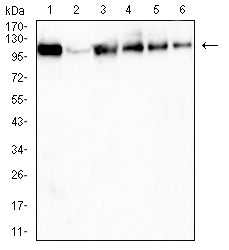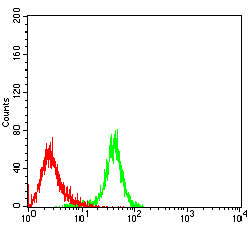

| WB | 1/500 - 1/2000 | Human,Mouse,Rat |
| IF | 咨询技术 | Human,Mouse,Rat |
| IHC | 咨询技术 | Human,Mouse,Rat |
| ICC | 技术咨询 | Human,Mouse,Rat |
| FCM | 1/200 - 1/400 | Human,Mouse,Rat |
| Elisa | 咨询技术 | Human,Mouse,Rat |
| Aliases | UHX1 |
| Entrez GeneID | 8237 |
| clone | 2D7A11 |
| WB Predicted band size | 109.8kDa |
| Host/Isotype | Mouse IgG1 |
| Antibody Type | Primary antibody |
| Storage | Store at 4°C short term. Aliquot and store at -20°C long term. Avoid freeze/thaw cycles. |
| Species Reactivity | Human |
| Immunogen | Purified recombinant fragment of human USP11 expressed in E. Coli. |
| Formulation | Purified antibody in PBS with 0.05% sodium azide |
+ +
以下是关于USP11抗体的3篇代表性文献及其摘要概括:
1. **文献名称**:*USP11 regulates BRCA1-mediated cancer immunity by deubiquitinating and stabilizing BRCA1*
**作者**:Wu-Baer F 等(2020)
**摘要**:研究揭示了USP11通过去泛素化并稳定BRCA1蛋白,调控DNA损伤修复和肿瘤免疫应答的机制。实验中利用USP11抗体验证其与BRCA1的相互作用,并证明USP11缺失导致BRCA1降解,影响乳腺癌细胞对化疗的敏感性。
2. **文献名称**:*USP11 deubiquitinates the tumour suppressor p14ARF and promotes cellular proliferation*
**作者**:Yuan J 等(2018)
**摘要**:该文献发现USP11通过去泛素化肿瘤抑制因子p14ARF,抑制其蛋白酶体降解,从而调节细胞周期和增殖。研究通过免疫共沉淀(使用USP11抗体)证实了USP11与p14ARF的直接结合,并阐明其在肺癌中的促癌作用。
3. **文献名称**:*USP11 antagonizes IFN-β production by deubiquitinating IRF3/7 in antiviral innate immunity*
**作者**:Wang S 等(2021)
**摘要**:研究报道USP11通过去泛素化转录因子IRF3/7.抑制I型干扰素(IFN-β)的产生,从而负调控抗病毒天然免疫。实验中使用USP11抗体进行Western blot和免疫荧光,验证其在病毒感染模型中的表达定位及功能。
4. **文献名称**:*USP11 controls RIG-I-mediated immune responses by deubiquitinating TBK1*
**作者**:Zhang L 等(2019)
**摘要**:该研究证明USP11通过去泛素化TBK1激酶,抑制RIG-I信号通路介导的抗病毒反应。实验通过USP11抗体敲低和过表达模型,揭示其在调控先天免疫中的关键作用,为抗病毒治疗提供潜在靶点。
这些文献均通过USP11抗体验证了其在癌症、免疫或病毒感染中的分子机制,涵盖蛋白质相互作用、功能调控及疾病相关性研究。
USP11 (Ubiquitin-Specific Protease 11) is a deubiquitinating enzyme (DUB) belonging to the ubiquitin-specific protease family. It plays a critical role in regulating protein stability, DNA damage repair, and cellular signaling by removing ubiquitin chains from target proteins. USP11 is involved in key pathways such as the DNA damage response (e.g., interacting with BRCA1 and BRCA2), TGF-β signaling, and apoptosis. Dysregulation of USP11 has been linked to cancer progression, neurodegenerative diseases, and immune disorders, making it a potential therapeutic target.
USP11 antibodies are essential tools for studying its expression, localization, and function. They are widely used in techniques like Western blotting, immunofluorescence, immunoprecipitation, and immunohistochemistry. Researchers rely on these antibodies to investigate USP11's role in cellular processes, including its interaction with substrates like p53. IκBα, and γ-tubulin. Specificity and validation are critical, as cross-reactivity with other DUBs (e.g., USP7 or USP15) may occur. Commercial USP11 antibodies are available in polyclonal or monoclonal forms, often developed in hosts like rabbit or mouse. Recent studies also explore USP11 inhibitors, highlighting the antibody's utility in preclinical research for targeting USP11-associated pathologies.
×